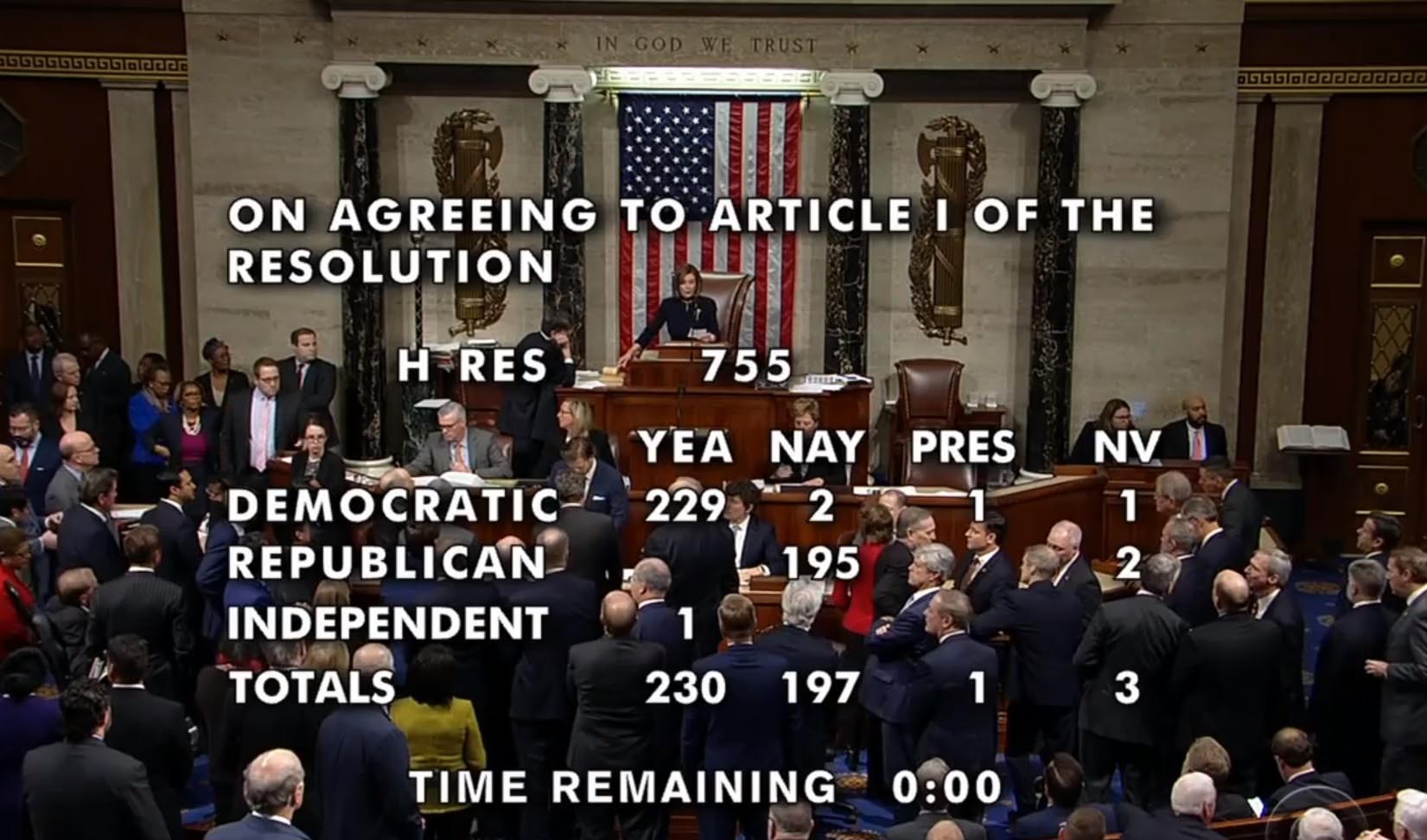
The third impeachment of a president in American history came Dec. 18 in a still deeply divided U.S. House of Representatives and country.
The House passed two articles of impeachment against President Donald Trump without any Republican members voting for them. Democrats voted 230-197 to approve an article charging the president with abuse of power and 229-198 for a charge of obstruction of Congress. Two Democratic members voted against the abuse of power article and three against the obstruction article.
The roll calls were nearly the same as one taken Oct. 31, when the House voted 232-196 for a resolution instructing committees to continue their investigations into possible impeachment of Trump. No Republican members voted for that resolution, while two Democrats voted against it.
The American public’s division from late October to the vote Dec. 18 remained almost identical.
A survey for The Washington Post and ABC News announced Dec. 17 showed 49 percent of Americans said the president should be impeached and removed from office, while 46 percent said he should not. A poll conducted Oct. 27-30 for the same news organizations found 49 percent of Americans favored impeachment and removal, while 47 percent were opposed.
An analysis by RealClear Politics of a dozen polls conducted from Dec. 2-17 found an average of 48 percent of Americans opposed impeachment and 47.2 favored it.
Since the House has approved impeachment articles, the next step in potentially removing the president from office is a Senate trial at which U.S. Supreme Court Chief Justice John Roberts would preside. A two-thirds majority would be needed to convict and remove Trump from office.
Previously, the House voted to impeach only Andrew Johnson in 1868 and Bill Clinton in 1998.
The Senate failed to convict either president, although Johnson survived by only a vote. The House initiated an impeachment inquiry against Richard Nixon in 1974, but he resigned before the Judiciary Committee sent articles of impeachment to the full chamber.
Speaker of the House Nancy Pelosi told reporters Dec. 19 she would await the Senate leadership’s announcement of the process in that chamber before naming managers to handle the House’s case before the senators.
In the same news conference, she said, “No one is above the law, and the president has been held accountable.”
Meanwhile, Trump tweeted Dec. 19, “I got impeached last night without one Republican vote being cast with the Do Nothing Dems on their continuation of the greatest Witch Hunt in American history.”
Some Democrats have been beating the drums for Trump’s impeachment for a variety of reasons since he took office in 2017, but the focus of the articles approved Dec. 18 is a late July phone call between Trump and new Ukrainian President Volodymyr Zelensky.
In the call, Trump appeared to encourage Zelensky to investigate former Vice President Joe Biden, a leading Democratic candidate to challenge the president next November, and his son Hunter, who was on the board of a Ukrainian natural gas company. In addition, Trump delayed the transfer of nearly $400 million in congressionally approved military aid to Ukraine before the call.
Democrats accused Trump of using his office for political gain and obstructing the House’s investigation. Though some Republicans criticized or expressed concerns about the nature of Trump’s conversation with Zelensky, none supported impeachment.
During and after the hours of debate Dec. 18, Republicans who are members of Southern Baptist churches offered similar reasons for voting against impeachment.
Rep. Doug Collins of Georgia – a former pastor in Gainesville and the lead Republican on the Judiciary Committee – said on Twitter, “Democrats broke their own rules to declare a president guilty of crimes they couldn’t prove and their articles didn’t allege. Tonight, Democrats shamed an institution they claim to love and failed a country they claim to serve.”
Rep. Steve Womack of Arkansas tweeted the impeachment inquiry “was not rooted in fairness or facts – it was driven by politics.”
“This was a completely partisan process with a partisan result,” he said.
Rep. Mike Johnson of Louisiana said in a written statement, “The real abuse of power here is on the part of the House Democrats, as they have recklessly pursued this impeachment – 20 times faster than the impeachment investigation of Bill Clinton – to reach their predetermined political outcome.”
Rep. Mike Bost of Illinois said in a written release, “Future generations will look back on today as the day Speaker Pelosi and the Washington Democrats put partisan politics above the best interests of the country. For them, the ends would justify the means if it meant overturning the results of the 2016 election.”
Rep. Al Green of Texas – the lone member of a Southern Baptist Church among Democrats, according to Baptist Press records – said in his floor speech, “[I]f this president is allowed to thwart the efforts of Congress with a legitimate impeachment inquiry, the president will not only be above the law, he will be beyond justice.”
One Republican congressman, Barry Loudermilk of Georgia, went so far in his floor speech in defending Trump as to invoke Jesus’ appearance before Pilate on His way to the cross. Pontius Pilate “gave Jesus the opportunity to face His accusers,” Loudermilk said. “During that sham trial, Pontius Pilate afforded more rights to Jesus than Democrats have afforded this president in this process.”
Christians and non-Christians on social media offered rebukes of Loudermilk’s comparison of the treatment of the Lord Jesus with that of the president.
The Democrats who voted against the article on abuse of power were Reps. Collin Peterson of Minnesota and Jeff Van Drew of New Jersey. Rep. Jared Golden joined them in voting against the article on obstruction of Congress. Rep. Tulsi Gabbard, a Democratic candidate for president, voted “present” on both articles.
(EDITOR’S NOTE – Tom Strode is Washington bureau chief for Baptist Press.)


